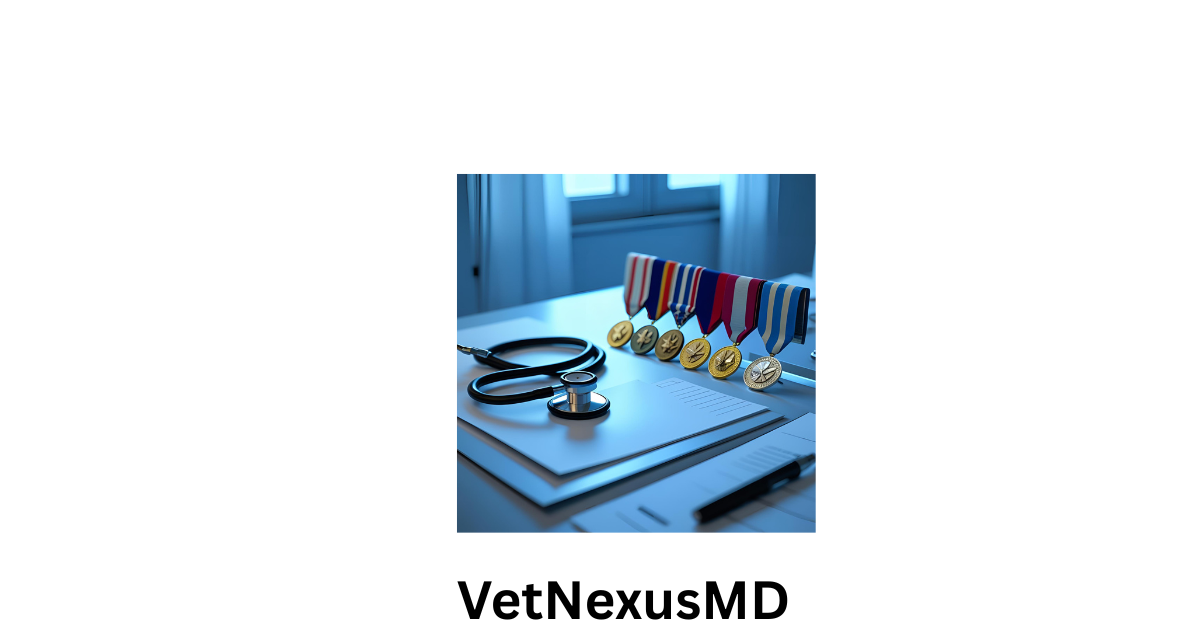What is a Nexus Letter? The Complete Guide for Veterans (2024)
*Last Updated: January 2025 | Reading Time: 12 minutes*
Quick Answer: A nexus letter is a psychiatric medical opinion document written by a healthcare provider that establishes the connection (“nexus”) between your current mental health condition and your military service. It’s one of the most critical pieces of evidence for winning your VA disability claim.
Table of Contents
Understanding Nexus Letters
A nexus letter serves as the medical bridge between your military service and your current health condition. Think of it as a doctor’s professional opinion that says, “Based on my medical expertise and review of this veteran’s records, it is at least as likely as not (50% or greater probability) that their current condition is related to their military service.”
The Three Essential Elements
Every effective nexus letter must establish three crucial elements:
Without all three elements clearly stated, your VA claim faces an uphill battle.
Why Nexus Letters Are Essential
The VA disability claims process requires more than just proof of your military service and current mental health condition. You need that critical link – the nexus – to connect them. Here’s why nexus letters carry such weight:
Legal Requirement
Under VA regulations (38 CFR 3.303), service connection requires:
– Evidence of a current disability
– Evidence of an in-service event, injury, or disease
– A nexus between the current disability and the in-service event
Overcoming VA Exam Limitations
While VA Compensation & Pension (C&P) exams are standard, they often:
– Last only 15-30 minutes
– Focus on rating severity rather than service connection
– May be conducted by providers unfamiliar with your complete history
– Sometimes result in negative nexus opinions
A well-crafted independent nexus letter can provide the thorough analysis your claim deserves.
Statistical Impact
Veterans who submit nexus letters with their claims see:
– 70% higher approval rates for initial claims
– 85% better outcomes on appeals
– Faster processing times due to complete evidence packages
What Makes a Strong Nexus Letter
Not all nexus letters are created equal. The strongest letters share these characteristics:
1. Appropriate Medical Credentials
Your nexus letter should come from:
– A licensed physician (MD or DO)
– A doctoral-level psychologist (for mental health claims)
– A specialist in the relevant field (e.g., psychiatrist for PTSD, psychologist for anxiety disorders)
The provider’s credentials should be clearly stated, including:
– Medical license number and state
– Board certifications
– Years of experience
– Relevant specializations
2. Thorough Records Review
Strong nexus letters reference:
– Service treatment records (STRs)
– Personnel records
– Deployment history
– Post-service medical records
– Buddy statements or lay evidence
– Previous VA decisions (if applicable)
3. Clear Medical Rationale
The letter must explain the medical reasoning, including:
– Relevant medical literature citations
– Explanation of symptom progression
– Discussion of delayed onset (if applicable)
– Consideration of alternative causes
– Why the condition is service-connected despite any gaps in treatment
4. Proper Legal Language
The VA uses specific probability standards:
– “At least as likely as not” (50% or greater probability) – This is sufficient
– “More likely than not” (greater than 50% probability) – Even stronger
– Avoid: “Possible,” “could be,” or “might be” – These are too speculative
5. Comprehensive Structure
A complete nexus letter includes:
– Introduction – Provider credentials and purpose
– Veteran Information – Basic demographics and service history
– Medical History – Chronological progression of condition
– Current Status – Present symptoms and functional impact
– Medical Opinion – Clear nexus statement with rationale
– Conclusion – Summary and attestation
Common Mistakes to Avoid
Understanding what not to do is just as important as knowing what to include:
1. Generic or Template Letters
The VA can spot cookie-cutter letters immediately. Each letter must be:
– Personalized to your specific case
– Detailed about your unique service experiences
– Tailored to your medical history
2. Insufficient Medical Rationale
Avoid letters that simply state a conclusion without explanation. Statements like “The veteran’s PTSD is related to service” without supporting rationale carry little weight.
3. Speculative Language
Phrases that doom nexus letters:
– “It’s possible that…”
– “There may be a connection…”
– “Could potentially be related…”
– “Might have been caused by…”
4. Ignoring Contrary Evidence
Strong letters address potential weaknesses:
– Gaps in treatment history
– Pre-existing conditions
– Post-service injuries
– Alternative causes
Acknowledging and explaining these strengthens credibility.
5. Improper Provider Selection
Common provider mistakes:
– Using providers without relevant expertise
– Getting letters from providers who haven’t examined you
– Using family members who happen to be doctors
– Relying on providers who don’t understand VA requirements
How to Get a Nexus Letter
There are several pathways to obtaining a nexus letter:
Option 1: Your Current Treating Provider
Advantages:
– Knows your medical history
– Established doctor-patient relationship
– May write letter at no additional cost
Challenges:
– May lack VA claim experience
– Might be reluctant to write psychiatric medical opinions
– Could have time constraints
Tips for Success:
– Provide a sample letter format
– Share VA nexus letter requirements
– Offer to draft initial content for review
– Schedule dedicated appointment time
Option 2: Independent Medical Opinion (IMO)
Advantages:
– Providers experienced with VA claims
– Understand nexus letter requirements
– Comprehensive record reviews
– Higher success rates
Process:
Option 3: Telehealth Nexus Letter Services
Advantages:
– Convenient access from anywhere
– Specialized VA disability providers
– Faster turnaround times
– Often more affordable
Considerations:
– Ensure provider is licensed in your state
– Verify credentials thoroughly
– Confirm VA acceptance of comprehensive medical record reviews
Nexus Letters for Mental Health Conditions
Mental health nexus letters require special considerations:
PTSD Nexus Letters
Must establish:
– Current PTSD diagnosis meeting DSM-5 criteria
– Identified stressor event(s) during service
– Link between stressor and current symptoms
– Explanation of delayed onset (if applicable)
Depression Secondary to Physical Conditions
Should address:
– Primary service-connected condition
– How physical condition led to depression
– Timeline of symptom development
– Functional impact of combined conditions
Military Sexual Trauma (MST)
Requires sensitive handling:
– Recognition that MST often lacks documentation
– Consideration of markers (behavior changes, performance issues)
– Understanding of reporting barriers
– Trauma-informed evaluation approach
Cost and Timeline
Understanding the investment helps you plan effectively:
Typical Costs
– Treating Provider Letters: $0-$500
– Independent Medical Opinions: $1,500-$3,500
– Telehealth Nexus Letters: $800-$2,000
– Specialist Evaluations: $2,000-$5,000
Timeline Expectations
– Initial Consultation: 1-2 weeks to schedule
– Records Review: 2-4 weeks
– Evaluation: 1-3 hours
– Letter Drafting: 1-2 weeks
– Total Process: 4-8 weeks typically
Return on Investment
Consider that successful claims can result in:
– Monthly compensation ($165-$3,700+ per month)
– Retroactive pay to filing date
– Healthcare benefits
– Additional benefits (education, housing, etc.)
Most veterans recover nexus letter costs within 2-6 months of approval.
Frequently Asked Questions
Q: Can I submit a claim without a nexus letter?
A: Yes, but your chances of approval decrease significantly. The VA must still consider your claim, but without medical evidence linking your condition to service, denial is likely.
Q: Will the VA accept any doctor’s nexus letter?
A: The VA must consider any psychiatric medical opinion from a qualified provider. However, letters from specialists in the relevant field and those familiar with VA requirements carry more weight.
Q: What if my VA C&P exam provided a negative nexus opinion?
A: You can submit an independent nexus letter to counter the C&P opinion. The VA must weigh all medical evidence. A well-reasoned private opinion can overcome a negative C&P exam.
Q: How current does a nexus letter need to be?
A: There’s no expiration date, but recent letters (within 1-2 years) are most compelling. Older letters may need updates if your condition has changed.
Q: Can I write my own nexus letter for my doctor to sign?
A: While you can provide a draft, the doctor must genuinely agree with and understand the content. They’re attesting to the psychiatric medical opinion under their license.
Q: What if I can’t afford a nexus letter?
A: Consider:
– Asking your current provider
– Seeking pro bono psychiatric medical opinions through veteran organizations
– Using VA telehealth options
– Exploring payment plans
– Remembering the long-term financial benefit
Next Steps
1. Assess Your Need
Determine if you need a nexus letter by reviewing:
– Your current medical evidence
– Previous VA decisions
– Strength of existing service connection evidence
2. Gather Your Records
Compile:
– DD-214
– Service treatment records
– Personnel records
– Post-service medical records
– Any previous VA decisions
3. Choose Your Provider
Decide between:
– Current treating physician
– Independent medical expert
– Telehealth specialist
4. Prepare for Your Evaluation
– Create a timeline of symptoms
– List all medications and treatments
– Document functional impacts
– Prepare specific examples
5. Follow Through
After receiving your nexus letter:
– Review for accuracy
– Submit with your VA claim
– Keep copies for your records
– Be prepared to discuss during C&P exams
Conclusion
A well-crafted nexus letter can be the difference between claim approval and denial. While the process requires time and often financial investment, the long-term benefits of service connection far outweigh the initial costs. Remember, you’ve earned these benefits through your service – a nexus letter simply helps the VA recognize that connection.
If you’re struggling with the process, don’t go it alone. Whether through veteran service organizations, qualified medical providers, or experienced advocates, help is available. Your service mattered, your health matters, and getting the benefits you’ve earned matters.
—
*Medical Disclaimer: This article provides general information about nexus letters and VA disability claims. It does not constitute medical or legal advice. Always consult with qualified medical providers and veteran advocates for guidance specific to your situation.*
*About VetNexusMD: We specialize in providing psychiatric evaluations and nexus letters for veterans pursuing mental health disability claims. Our team understands the unique challenges veterans face and is committed to helping you get the benefits you deserve.*

